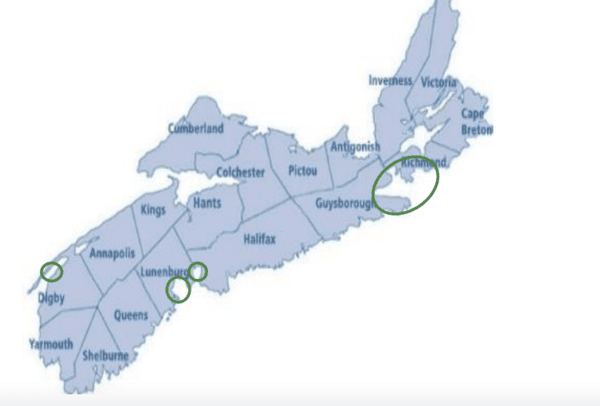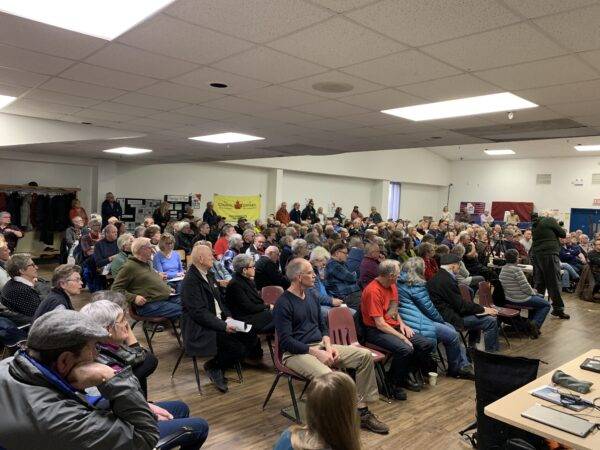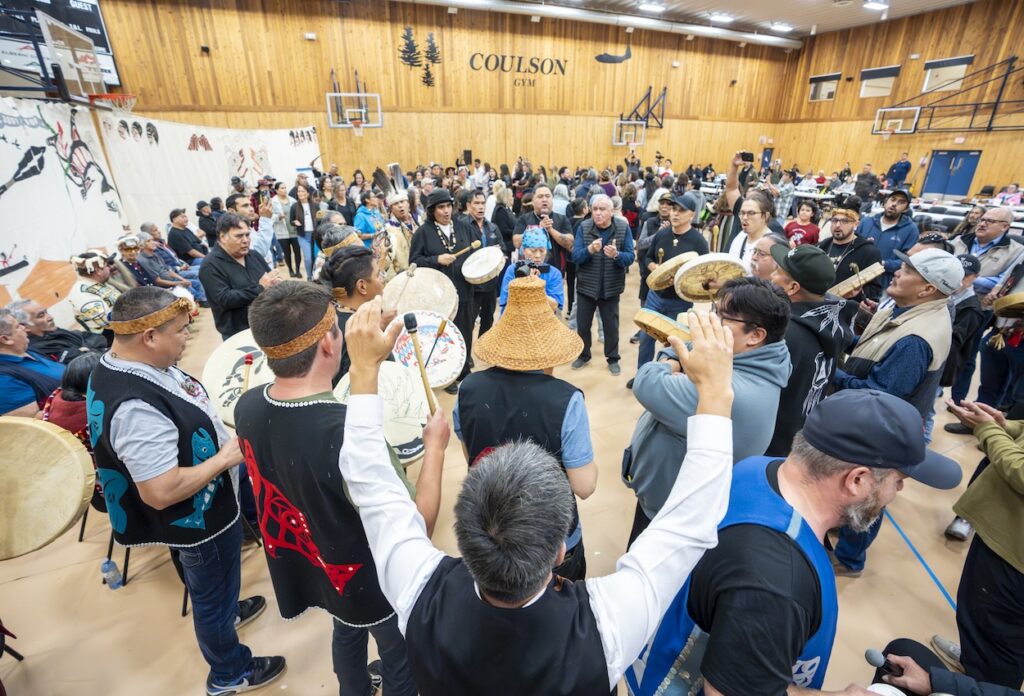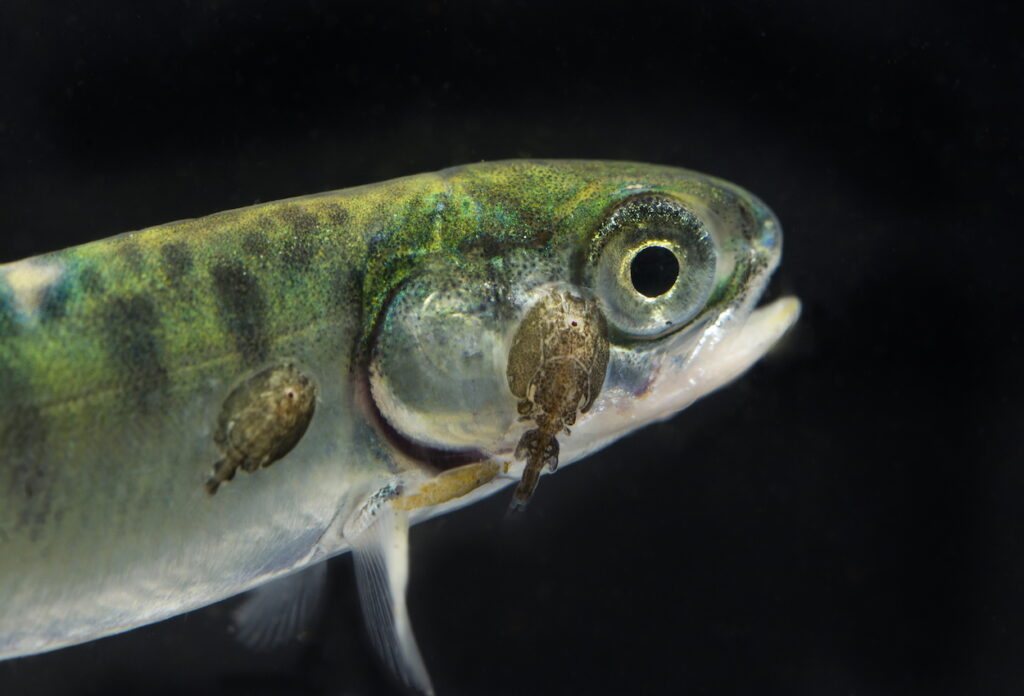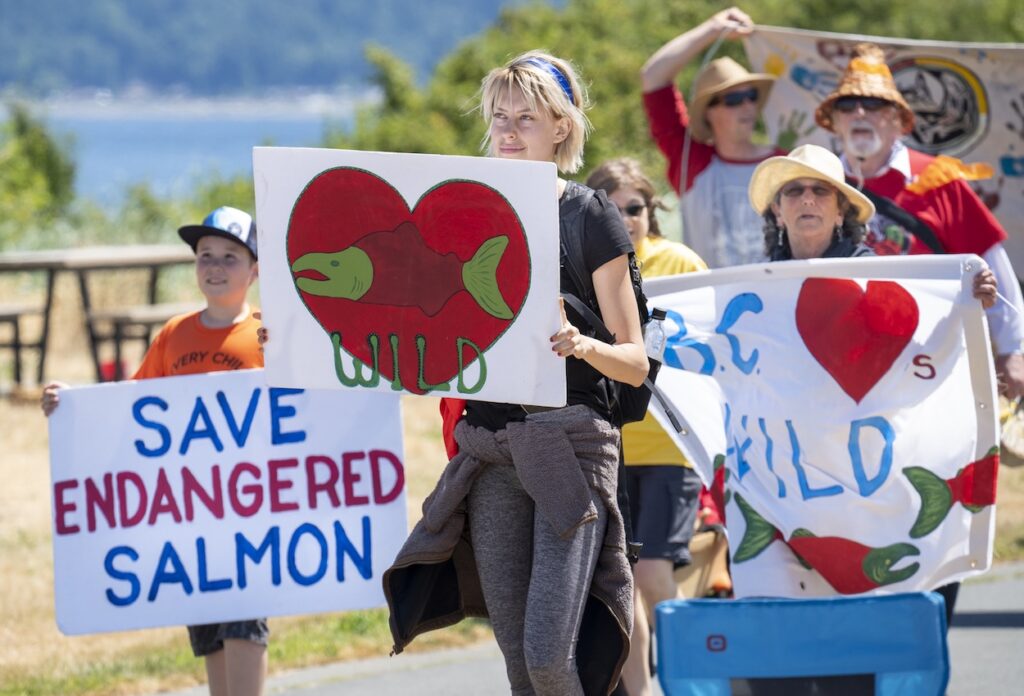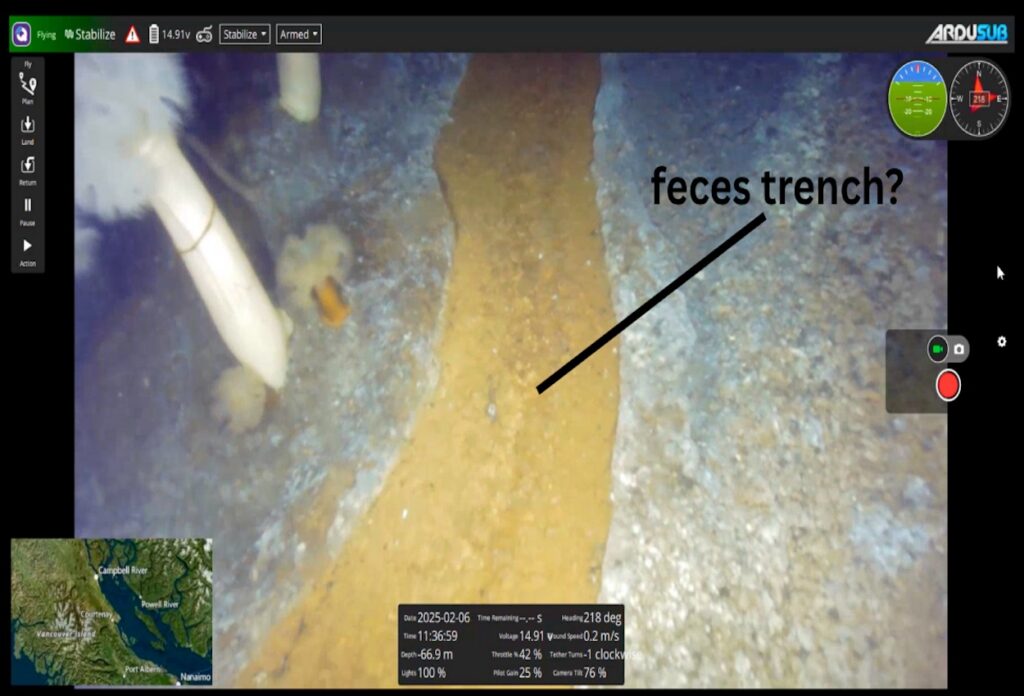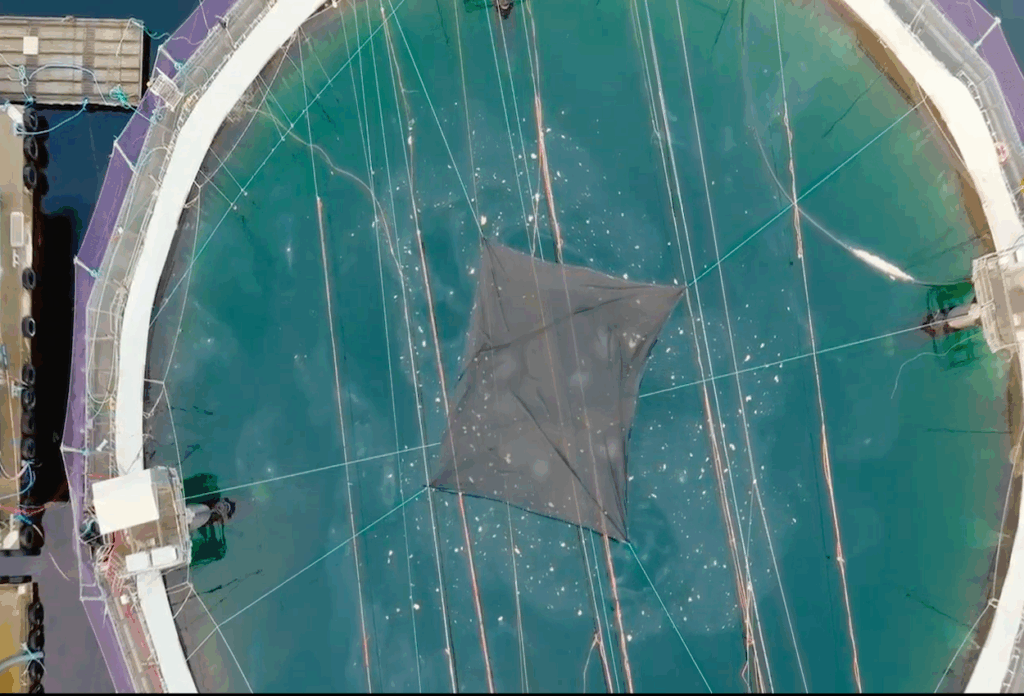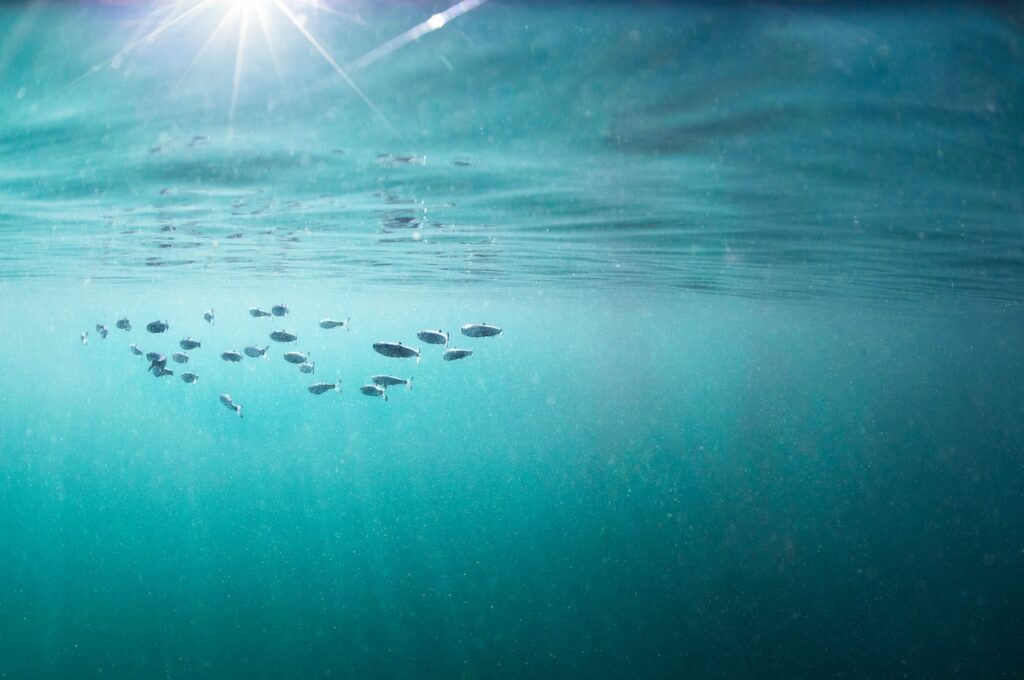By the time we touched down in Halifax back in February, the ice storm had passed. The power was still off in some parts of the city, and a bitter wind whipped our coats as we hailed a ride downtown. It was the ‘before time’ and my travelling companion and I were unaware that in little more then two weeks Canada would be in Covid-19 shut down. But for now we were free to travel…
Global fish farm giant Cermaq was planning an expansion into Nova Scotia. Community concern was mounting as grassroots groups got organized ahead of Cermaq’s public open house sessions. Cermaq called their outreach “Hello Nova Scotia”. Ecology Action Centre had invited Karen Wristen (Living Oceans Society), Bob Chamberlin (First Nations Wild Salmon Alliance) and me on a speaking tour of Nova Scotia communities. We planned to bring lessons learned from the BC salmon farm fight.
Unlike in British Columbia, in Nova Scotia open net-pen aquaculture is regulated primarily by the provincial government. In 2019 the province granted Cermaq an “option to lease” in four regions of the province.
Cermaq planned major expansion for Nova Scotia
Cermaq was proposing a five hundred million dollar expansion including between fifteen to twenty farm sites, four hatcheries and two processing plants. Target production levels would be similar to Cermaq’s BC operations—around twenty thousand metric tons of fish. The expansion would have taken the number of open net-pen fish farms in Nova Scotia from eight to twenty eight.
Public concern surrounding salmon farms in Nova Scotia is not new. In 2013, public opposition to the expansion of the fish farm industry brought a moratorium on new licences until the regulatory system had been reviewed and revised. Unwittingly fuelling public mistrust of their proposal, Cermaq hired Vickie Savoie as their Sustainable Development Director. Savoie’s former position was as manager of aquaculture development in the provincial department in charge of the regulatory review process. This revolving door between industry and government is not unfamiliar in BC.
Our delegation piled in to a mini van and headed for Digby, where the St. Mary’s Bay Protectors hosted a panel discussion. The church hall was full to capacity as we shared firsthand our accounts of the damage the fish farm industry has done in BC, and the work that has been done to get the farms out. The Q&A session was charged with anger and tears as people tried to comprehend the impending environmental disaster facing them if Cermaq was to get the go-ahead to operate in Nova Scotia.
Next it was on to the St. Margaret’s Bay Arena where the Twin Bays Coalition had organized a panel discussion attended by over three hundred people. We heard from speakers representing lobster fisherman, tourism, inshore fishermen and a Nova Scotian land-based closed containment salmon farm company. Nova Scotia and BC are at opposite ends of the country, but the similarities between our coastal communities was striking. We value our rural communities, ocean-going livelihoods, and beautiful shorelines. Fierce love of place surfaced at the threat posed by open net-pen fish farming.
Our final presentation, hosted by Protect Liverpool Bay Association, took place at the historic Astor Theatre. Folks in Liverpool are already familiar with the impacts of salmon farming, with Cooke Aquaculture operating a fish farm there. Cooke recently received approval for an expansion of the site and two new licenses in the Bay. In BC, fish farms are typically located up inlets, many miles away from settlements. In Nova Scotia the only protected waters are in bays lined with long-established communities. Brian Muldoon, a Protect Liverpool Bay volunteer, hosted our delegation at his waterfront home. The view was stunning, except for Cooke’s industrial salmon farm just a stone’s throw away. These existing farms are in the faces of locals, overlapping with lobster grounds and diminishing the scenic value for Nova Scotia’s tourism industry.
Our short trip was full of meetings, media interviews, delicious meals shared with community organizers, and sight-seeing on the fly from the mini van. As with Clayoquot Action’s Wild Salmon Delegation to Norway, strong alliances were formed with people working hard to protect our oceans from this polluting fish farm industry.
“Shit happens”
We returned home to BC and watched as media reported on Cermaq’s open houses. Informed, outraged citizens asked hard questions of Cermaq’s PR team. One CBC news clip showed a demanding audience member waving a copy of Clayoquot Action’s Going Viral Report! As reported by the Halifax Examiner, Cermaq Canada’s managing director David Kiemel responded to questions about mass die-offs, sea lice, pesticides, and viruses on Cermaq’s Clayoquot operations in BC: “Kiemel replied: “Mortality happens on salmon farms. We have a dedicated team of professionals, but shit happens, it’s farming, it’s not easy.”
Half an hour later, a Chester Basin resident spoke about coming from a long line of fisherfolk, and took issue with Kiemel’s attitude. Julie Chiasson:
“I came here tonight with an open mind to hear how you’d respond to what you did in those areas [in BC] and to hear, quite frankly, that… ‘shit happens’ is not really fair to the people in this room who make their livelihood fishing. We are a working shoreline, we have fishermen that make their livelihood off of our coast and we really need to know how are you going to assure us that when this “shit happens” that you have a process in place that you have done your due diligence to make sure that you can handle that so we can protect our fishing rights?”
The message from the Hello Nova Scotia open houses was: Goodbye Cermaq. In the face of overwhelming opposition Cermaq withdrew its proposal. This is a sweet victory for South Shore communities and beyond—proving once again that people power works!
The fight continues as Cooke Aquaculture has received approval for expansion in Nova Scotia. In late May groups around the province joined forces to form a new alliance against open-net pen fish farms. The Healthy Bays Network, consists of the St. Mary’s Bay Protectors, Protect Liverpool Bay, the Twin Bays Coalition, the Association for the Preservation of the Eastern Shore, with support from the Ecology Action Centre, the Atlantic Salmon Federation, and the Nova Scotia Salmon Association.
We’ll continue to work with allies across the country and around the world to see that this polluting industry is moved out of our precious oceans.
Bonny Glambeck is Campaigns Director at Clayoquot Action.
